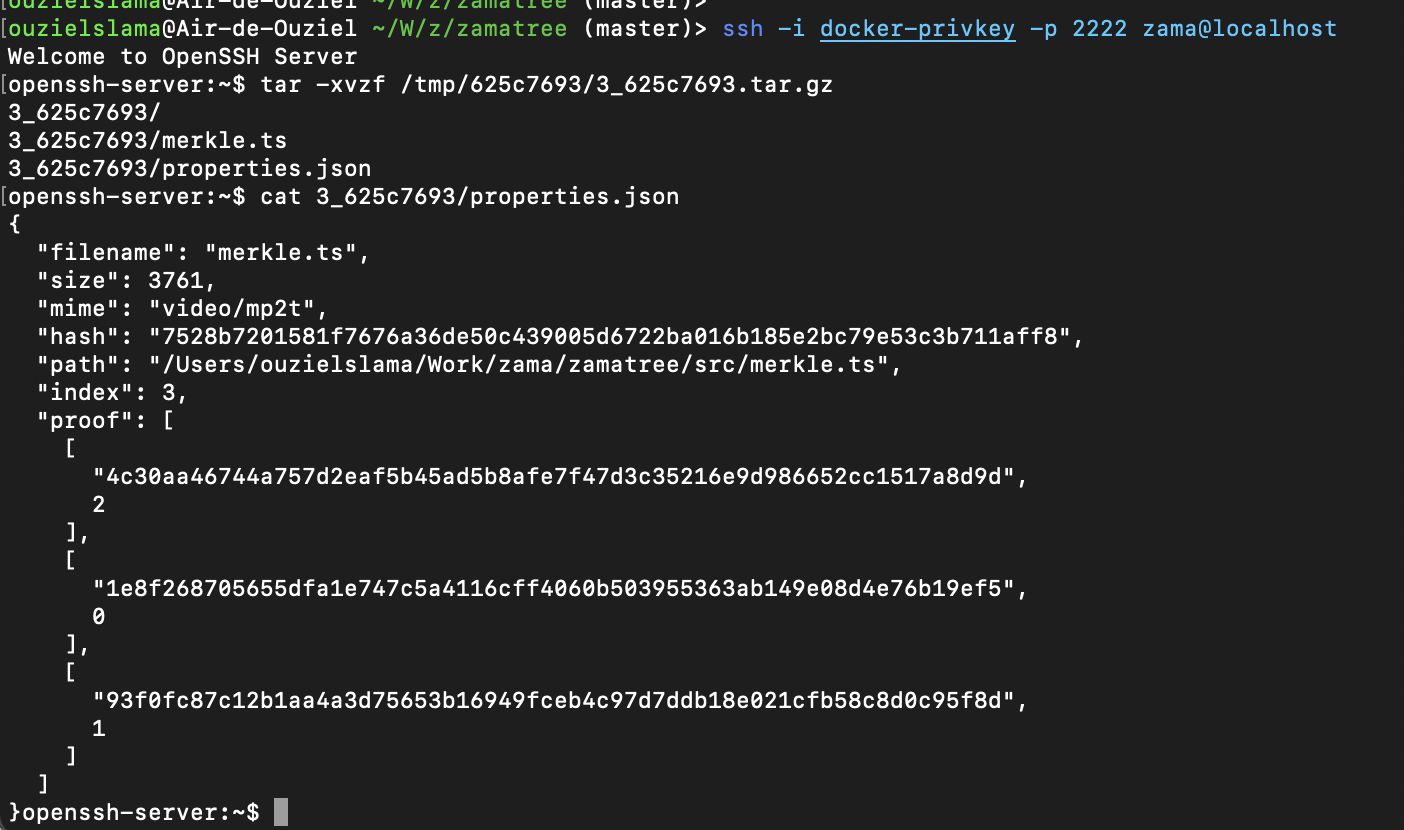zamatree
v1.0.3
Published
Zamatree is a command line utility for uploading and downloading files with integrity checking using a Merkle tree.
Downloads
27
Readme
Zamatree
Zamatree is a command line utility for uploading and downloading files with integrity checking using a Merkle tree.
Zamatree is completely “server agnostic” and does not require any special installation on the server as long as it is possible to upload and download files. Zamatree currently supports SSH servers (via scp) and Amazon S3, but the code is structured so that you can easily add other server types like Google Cloud or Azure for example.
Given the verification with a Merkle tree, the files can only be sent in packets of two minimum. The set of files sent at the same time with the zamatree upload command is called a block. Each block is uniquely identified with the Merkle root generated with the files it contains.
Installation
Requirement
scp- Node v18
Tested on MacOS and Alpine Linux.
Quickstart
$ nvm use v18
$ npm install -g zamatree
$ zamatree help
$ vi ~/.zamatree/servers.jsonUpdate the S3 id and key then:
$ zamatree upload './*.json' s3Download and install from source
$ git clone [email protected]:ouziel-slama/zamatree.git
$ cd zamatree
$ npm install && npm run build && npm link
$ zamatree helpNOTE: on Linux you probably should use sudo npm link
To start a test openssh server:
$ chmod 600 docker-privkey
$ docker-compose upTo run tests:
$ npm run testConfigure
The servers are configured in the ~/.zamatree/servers.json file. A default configuration, containing the test openssh docker server and a S3 test account, is automatically generated the first time zamatree is run.
Edit this file to update the S3 key or add a server.
$ zamatree help # to generate the default config file
$ vi ~/.zamatree/servers.jsonHere an example of this file:
{
"docker": {
"storage": "scp",
"host": "zama@localhost",
"port": 2222,
"key": "/Users/ouzielslama/Work/zama/zamatree/docker-privkey",
"path": "/tmp"
},
"server1": {
"storage": "scp",
"host": "alpine",
"path": "/home/tower"
},
"s3": {
"storage": "s3",
"bucket": "zamabucket",
"aws_key_id": "AKIATFAIXLJP7QQT5IKB",
"aws_secret_key": "<AWS_SECRET_KEY>"
}
}Note: for scp servers, zamatree supports hosts (key path and port) defined in ~/.ssh/config.
Usage

Upload files
$ zamatree upload <glob_pattern> <server_name_defined_in_servers_json>For example:
$ zamatree upload './src/**/*.ts' s3

List uploaded files
$ zamatree files
$ zamatree blocks

Download a file
Dowload a file in the current directory.
$ zamatree download <block_short_hash> <file_index>You can specify the destination folder with:
$ zamatree download <block_short_hash> <file_index> <destination_folder>For example
$ zamatree download 947aeb49 5

Implementation
Methodology
To ensure maximum compatibility with existing cloud services, Zamatree is designed to leave no responsibility for the server other than storing files. All Merkle tree generation and verification operations are done on the client.
Before being uploaded to a server, the file is packaged in a tar.gz archive, accompanied by a properties.json file which contains the Merkle proof.

Zamatree keeps Merkle's root hash in a file ~/.zamatree/blocks/<blockShortHash>.json and uses it when downloading a file to check Markle's proof of the properties.json file.

Code organization
The two most important modules are src/merkle.ts and src/filesblock.ts.
src/merkle.ts: implementation of the Merkle tree. For nodes that have no brothers (on levels with an odd number of nodes), I use the same method as Bitcoin core by concatenating the hash with itself. Given that we generate all the proofs at the same time as the root, the code could be optimized to only go through the Merkle tree once and never recalculate the same hash but I preferred to prioritize readability for this challenge. This module exposes 3 functions:getMerkleProof,getMerkleRoot,verifyProof.src/fileblocks.ts: this module is responsible for preparing the files before uploading them and also for checking the files after downloading them. It is this module which generates a json file per block (kept on the client) as well as a json file per file containing the proof of Merkle (uploaded with the file). This module exposes 5 functions:uploadBlock,downloadFile,listAllFiles,listFiles,listBlocks.src/cli.ts: a command line wrapper for the 5 functions exposed byfileblock.tssrc/config.ts: Here is defined the maximum size of files and blocks as well as the default servers.src/storages/: This folder contains one module per server type. For nowscp.tsands3.ts. To be used byfilesblock.tsthese modules must expose two functions:
const upload = async(folderPath: string, serverName: string)
const download = async(destFolder: string, fileName: string, serverName: string)Note about comments in code.
The code is deliberately almost not commented. I try as much as possible to practice “code as comment”. Comments are only there to justify algorithm choices, arbitrary constants or particularly complex lines of code. For the rest, the names of functions and variables must be clear enough and the code readable enough to not require comments.
Short-comings and Todos
- Use Rust or Go to develop a library that can be easily integrated into other projects. I'm currently working with Typescript, so it was the fastest language for this challenge.
- better error handling and more tests.
- Retry and resume commands for failed upload.
- Support more storages like Webdav, HTTPS and other cloud services than S3.
- Command to add file in a block (needs to download, update and upload some of the proofs).
- GUI. With a local web server and an HTML/JS interface.
- Give the possibility of storing files from the same blocks on several different servers. To distribute or double the storage.
- Support large files, by splitting them into several small files.
- Make a backup of root hashes with
zamatree upload. - Add a command to add/edit/delete a server without editing the json file. ...
